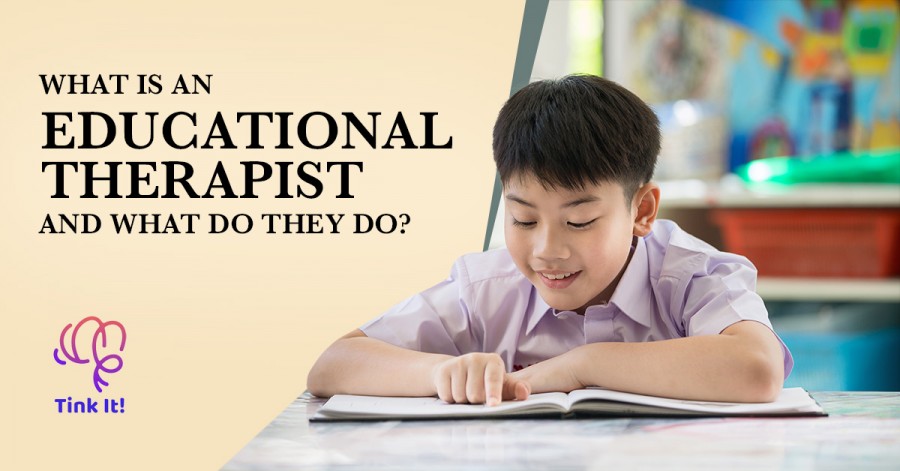What Is an Educational Therapist and What Do They Do?
Published 03 May 2023 at 17:32
Tickikids Blog Singapore > Childhood reading > What Is an Educational Therapist and What Do They Do?

Learning in a formal setting is often a challenging yet extremely rewarding activity for young children. Understanding new skills and concepts can present learners with plenty of difficulties, but there’s also an incredible feeling of accomplishment that comes when things finally fall into place. This sense of self-fulfilment can give children the confidence and motivation they need to tackle the next lessons. Following this pattern, they can keep advancing and making progress towards their academic goals.
How Do Educational Therapists Figure in a Student’s Learning Journey?
Not all educational journeys are smooth sailing. Even in a country with a top-ranked education system like Singapore, there are instances where students have trouble keeping up with the pace of learning that is expected of someone of their age. The inability to get the results they want, in turn, can damage a student’s self-esteem and well-being and alienate them from their peers. Over time, they might even get discouraged from trying their best to learn and develop their capabilities.
Fortunately, some of the best educational therapists Singapore has to offer can provide expert assistance to students who are facing such difficulties. Unlike tutors who are focused on helping students maintain or improve their grades, educational therapists are determined to identify why a student struggles in their academic endeavours. Furthermore, these professionals empower students to rediscover their love of learning by teaching them how to manage their thinking or learning differences and adapt to their current environment.
What Do Educational Therapists Offer the Students and Families They Work With?
Qualified educational therapists in Singapore come from different backgrounds and specialisations. Some of them have training in special education, speech therapy, or psychology. Their diverse skills and expertise enable these professionals to address the different needs and difficulties of their students and their families. Should you choose to work with an educational therapist, what can they do for you and your child? Here are some of the services that these professionals offer.
Assess the Student for Conditions That Can Affect Their Academic Performance

Educational therapists are familiar with different neurodevelopmental disorders that can make it difficult for a student to focus, interact with their environment, or develop specific abilities. They can assess if your child is having difficulties in school because of attention-deficit/hyperactivity disorder (ADHD), autism spectrum disorder (ASD), dyslexia, or dyscalculia. Definitively knowing if your child has these conditions will help you set realistic expectations for your child’s academic journey. Putting a name to a condition will also empower you to play a more effective role in supporting your child’s efforts to learn and turn you into a better advocate for your child.
Educate Family Members About the Student’s Conditions
An educational therapist can help you understand exactly how a condition affects your child and what you can do to support your child’s efforts to manage their symptoms. For instance, they can give you specific information on how to turn your home into a place that is more conducive to learning. Also, working with an educational therapist will enable you to follow up on the specific management and coping skills that your child needs to master so they can effectively deal with their symptoms by themselves.
Help Students Improve Their Strategies for Dealing with Their Learning Differences
Working with a child’s family is an important aspect of an educational therapist’s job. At the same time, these professionals also work directly with children with learning difficulties. If your child has executive dysfunction, for example, an educational therapist can teach them strategies that will improve their capacity to plan ahead and achieve their goals. Depending on the child’s age, the therapist can use play to help your child establish routines, heighten their focus, identify priorities, develop self-control, and improve their working memory. As your child masters these skills, they’ll improve their ability to mitigate the symptoms of their conditions and keep them from disrupting their learning process.
Design Personalised Intervention Programmes to Help Students Overcome Their Conditions
.jpg)
There’s no one-size-fits-all solution for managing neurodevelopmental disorders. It’s entirely possible that what works for one child will not work for another with the same condition. One of the services that educational therapists offer is designing an intervention programme that is customised to meet your child’s needs and goals. An educational therapist can come up with a programme that considers your child’s current capabilities and slowly builds the skills and strategies that they will need to become a thriving individual and a successful learner.
Many conditions can serve as sources of learning difficulties. It takes a team effort to ensure that these obstacles will not dampen a student’s passion for growth and development. If you suspect that your child has conditions that can negatively impact their learning experiences, it’s a good idea to have them assessed by a professional educational therapist in Singapore. This way, you can get definite answers to your questions as soon as possible and your child can maximise the benefits of early intervention programmes.